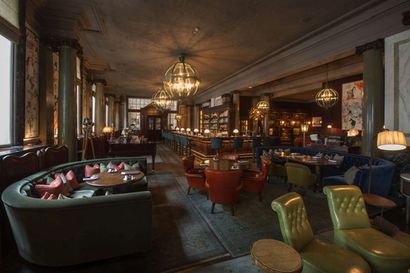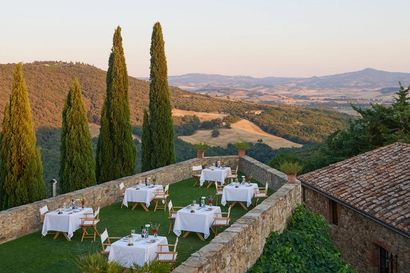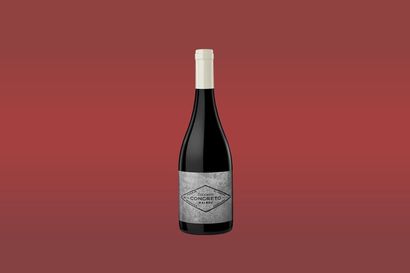Heston Blumenthal: Taking food back to the ‘Big Bang’
To take food into the future, the chef is taking inspiration from the past
Where do you take the nation’s favourite celebrity chef for a lunch interview? It’s okay to consider your choice carefully, and even to feel a little anxiety that the establishment won’t impress. But what you absolutely don’t expect is to get turned away at the door.
Indeed, it is confusing and disorientating to arrive at a restaurant pre-selected for the interview, only to discover that it is “closed for lunch”. Spotting us milling around outside, a young member of staff emerges from the shop to confront the group of people trying to get into his clearly shut restaurant. I ask if we can just come in and wait until they do open in 20 minutes.
‘No,’ says the young man officiously, adding: ‘I’m afraid when we’re closed, we’re closed.’ Thinking better of pointing out that I am with a huge star, the guy from the Waitrose adverts, we all begin to climb into the back of a taxi in search of lunch. But, as the door swings shut, the restaurant manager’s face is clearly visible for a moment as he realises that his young employee has just turned away perhaps the world’s best chef: Heston Blumenthal.
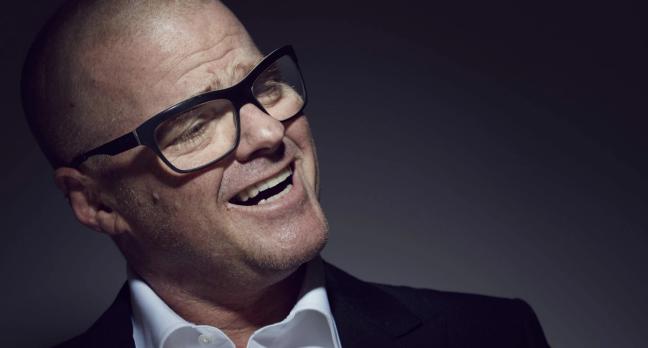
Earlier this year, Heston’s restaurant, The Fat Duck, regained its three Michelin stars. It had been notably absent from the 2016 food guide after it was closed for refurbishment and reopened too late to be considered by the judging panel. ‘Obviously we were taken out of the Michelin guide because we weren’t open,’ Heston says. ‘But they did the launch [of the next one] in central London and everyone came: the Rouxs [Michel and his son, Michel Roux Jr] and Sat [Bains], and it was a huge event.
‘And, when they started talking about the Duck, I was crapping myself and celebrating at the same time.’ After The Fat Duck had been closed for refurbishment, Michelin judged it as though it was a brand new restaurant. This meant eight unscheduled visits. Getting all three stars back, while being judged as a new opening, is quite an accomplishment.
‘I don’t think it’s ever been done before,’ Heston says proudly. ‘We went from three to zero to six. It’s still one of the crowning achievements of my life. But, if I had been given the choice of either keeping The Fat Duck as it was and not losing the stars, or going and doing this massive project that has taken me all over the globe, but risking never getting the stars back, I’d have closed it then and there.’
And that’s precisely what he did. In March 2014, Heston announced that The Fat Duck would close. ‘I’d wanted to redo the kitchen since 2000,’ he explains. ‘We were doing 40 covers a day and could have 700 plates of food coming out of the kitchen, maybe 750. It would have been impossible to do the refit while maintaining that level of service.’ Deciding that he would have to let The Fat Duck migrate to fairer pastures, Heston began searching for suitable locations for his restaurant. Not long before this, it was reported that he was receiving 30,000 phone calls a day from diners trying to make reservations.
‘As soon as we started looking for a new place to open we got offered Dubai’s Burj Khalifa, locations in Singapore, Courchevel, and we were very close to opening it in San Tropez.’ In fact, Heston was closest to opening in America, where he was in talks to bring his Dinner restaurant to an undisclosed Mandarin Hotel. But, when it ‘didn’t work out’ he decided that he would ‘stop with the States completely’. When a chef of Heston’s standing casts his net, he can all but guarantee coming back with a catch of the day.
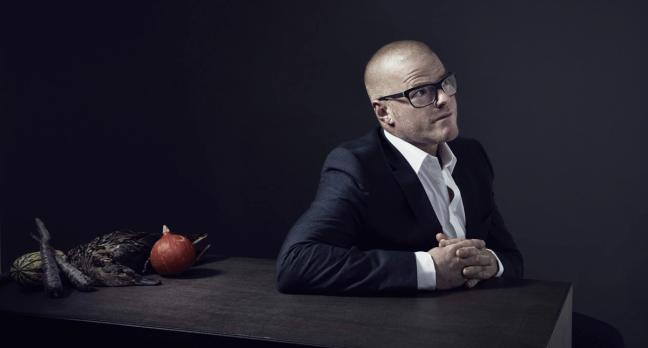
‘I had been going to Australia since 2002 and had been a regular fixture on their version of MasterChef, which is by far the biggest MasterChef on the planet,’ Heston says. By 2014, ‘Heston Week’ on MasterChef Australia was a highlight of the television schedule, and for the past few years he has also played a leading role in the show’s finals. ‘As I was out there I just saw this massive food explosion taking place, and to be brutally honest, I was probably involved in making it happen through MasterChef,’ he recalls. ‘I remember when I first arrived a taxi driver telling me about a new recipe for pita bread, and I think there’s only a handful of Starbucks in the whole country because they just won’t touch it.
‘So I see a food explosion like I’ve never seen in any country before, and I thought, “This is just right.” We went to work with James Packer at the Crown Resorts in Melbourne, then we built a pop-up restaurant inside with 50 covers and the most unbelievable kitchen. I was like a kid at Christmas. I just went: “I want one of those, one of those, one of those…” It was, and still is, the perfect set-up.’ In the six months that followed, The Fat Duck was torn down and rebuilt. It was a period that is clearly of huge personal and professional significance to Heston. He describes the time as having a ‘massive impact’ on the way he considers his life’s work to date.
I’m working with an evolutionary geneticist, an anthropologist and a cosmologist who trained with Stephen Hawking
As proud as Heston is about his work in Australia, and regaining his coveted Michelin stars, throughout our interview it is clear that Heston is focused on talking about his future, rather drudging through his past.Ironically it is at this stage in the interview that Heston starts to talk about human evolution and the effect cooking had on our prehistoric ancestors. At first, I’m concerned that he is making a meal of the interview. When he starts talking about hunter-gatherers, the development of the larynx and how he has to take his food ‘back to the Big Bang’, it’s easy to think that he is wandering off topic. But there was a third man silently involved in my interview with Heston, who was not at the dinner table with us but whose name still appeared at regular intervals. Yuval Noah Harari, author of the New York Times-bestselling Sapiens: A Brief History of Humankind, had clearly been on Heston’s nightstand.
‘I’m working with an evolutionary geneticist, an anthropologist and a cosmologist who trained with Stephen Hawking, and I’m just chucking these things at them, like quantum theory, string theory and relativity. That’s my whole life’s work right now.’ Heston has always been at the forefront of the foodie revolution in Britain, but even for him this is virgin territory. In the pursuit of his ‘bigger picture’, Heston’s work has taken him into a line of research that is treating food less like an art form, or even just as fuel, instead putting at the centre of the universe. In his own words, ‘the reason nobody has been able to connect these huge theories like evolution and relativity is because it’s all about food. Food is the connector.’
It is difficult to say how much of an influence Harari’s most recent book Homo Deus: A Brief History of Tomorrow has been on Heston’s ‘bigger picture’, but it is clear that he has ambitions of being far more than just a restaurateur. He wants to be sat not just at a dinner table, but at one around which are sitting scientists who are trying to discover the ways that food can, and has already shaped, our society.
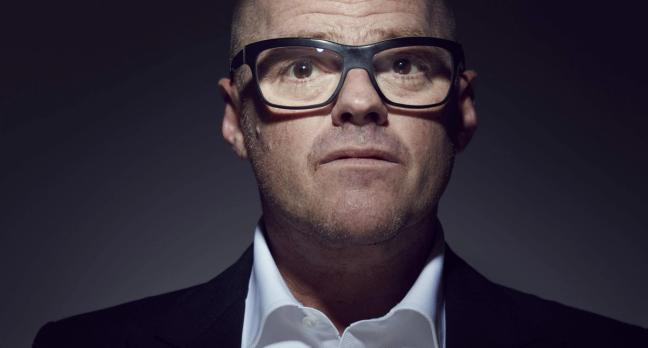
‘We don’t value food enough anymore,’ he says, explaining: ‘I believe that if you give two people cheese sandwiches one will just eat it immediately, but the other will wait and delay the gratification and give themselves 20 minutes on a park bench to eat it. Imagining the smell of dew on the grass, the sound of plastic rustling as you open the package, the touch of cardboard, and then finally tasting. They are the ones that can value every mouthful.’It is in Heston’s obsession with delayed gratification that you begin to penetrate what he means by ‘bigger picture’. He’s convinced that food was responsible for our evolutionary transformation from apes into Homo sapiens.
‘Discovering fire and cooking extended the day, so we no longer had to make the most of nine hours of eating like gorillas.’ And yes, I agree, this wasn’t the conversation I was expecting to have with Heston Blumenthal. ‘You have to eat to live,’ he continues. ‘It’s weird, it’s the only thing we do consciously to stay alive. When we breathe we just do it. But the very thing that makes us human beings is the thing that nobody is thinking about.’
Of course, he’s right. The routine of eating has shaped our society in huge, unseen ways. This is what Heston means by his ‘bigger picture’. He wants to understand the real relationship between us and food, starting with our long-forgotten meals as hunter-gatherers and stretching right up to how our brain looks while eating during an fMRI scan. He has always been called the scientist chef, but now Heston has well and truly replaced his kitchen with a laboratory.
Discovering fire and cooking extended the day, so we no longer had to make the most of nine hours of eating like gorillas
At the new and improved Fat Duck, Heston’s menu is a testament to humanity’s culinary history. Anyone who has experienced one of his taster menus (or even seen one on his TV shows) will know just how seminal memory and nostalgia is to the food Heston serves. ‘What the Duck is now,’ he explains, ‘what we are trying to do, is make memory something fantastic.’
Perhaps his most famous dish, ‘Sound of the Sea’ involves a conch shell, headphones playing coastal noises and a range of multi-sensory triggers that that are supposed to catapult you into your memories holidaying on a beach.‘It was a huge thing for us,’ he says. ‘We had people crying with happiness because it took them to a place, but it was more luck than anything; it triggered them. It wasn’t about sticking an atomiser on a table and putting on music.
‘It was about reminding people that a vine that goes deeper gets a better grape and wine. That a pistachio you unpeeled always tastes better, even though it’s the same nut. In other words, it’s all about getting the reward at the end of the day and working for it. How many lottery winners do you see actually going on to do something with that money?’Heston is reaping the rewards of a lifetime’s work, with six Michelin stars and three of the world’s top restaurants. ‘I love what I do,’ he says. ‘I have excitement every day of my life, especially when I get to think about the bigger picture and plan for the future.’
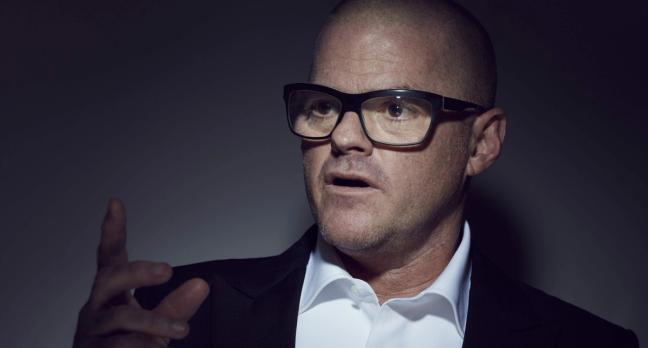
But where Heston and The Fat Duck are going, we won’t need chefs. ‘I’ve been talking with the guy who heads up the Western Australia Artificial Intelligence department, as I want to do a restaurant where the chefs are all robots. To get to where we are as a species – cars, buildings, government – we’ve all had to work. And we’ve been rewarded for that work. But now we’re relying on machines that don’t need food to work. We’re capable of saving more time, making life more efficient, but not improving. Now we’re becoming defunct. We’ve worked our way out of any usefulness. Women could get by fine without men now, so long as they could work out a way of being artificially inseminated. In the not-too-distant future all the jobs we do will be done, and done better, by machines that don’t need maternity leave, that don’t take time off sick, and can do anything we can faster and better.
‘So why are we learning things at school that computers can do better than us? Cooking is the only other subject that every other subject comes under for me. Food grows: that’s biology. It converts energy into by-products like nutrients, and that’s basic chemistry, and we bash it up and cook it and transform it, and that’s just physics. Everything takes place in the cooking process.’ Say what you like about Heston Blumenthal, but the man’s ambitious.
The March/April edition of Gentleman’s Journal is out now. Subscribe here.

Become a Gentleman’s Journal Member?
Like the Gentleman’s Journal? Why not join the Clubhouse, a special kind of private club where members receive offers and experiences from hand-picked, premium brands. You will also receive invites to exclusive events, the quarterly print magazine delivered directly to your door and your own membership card.
